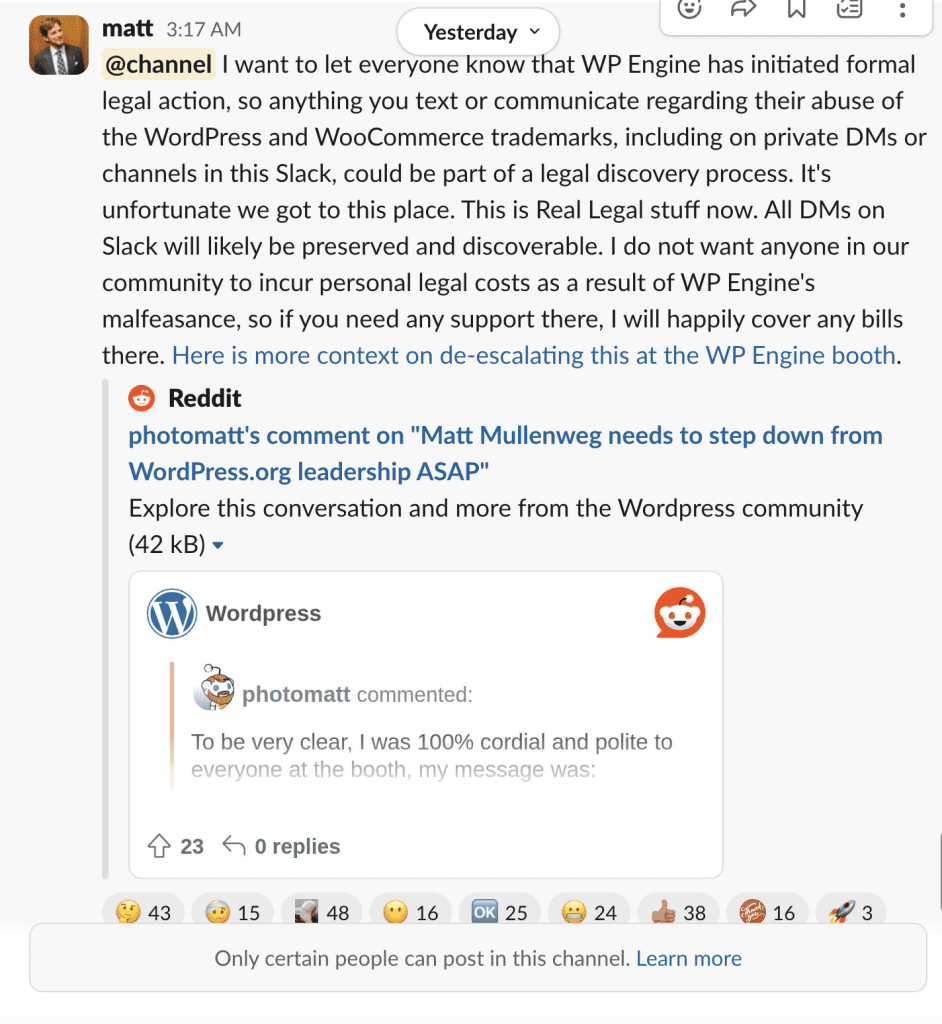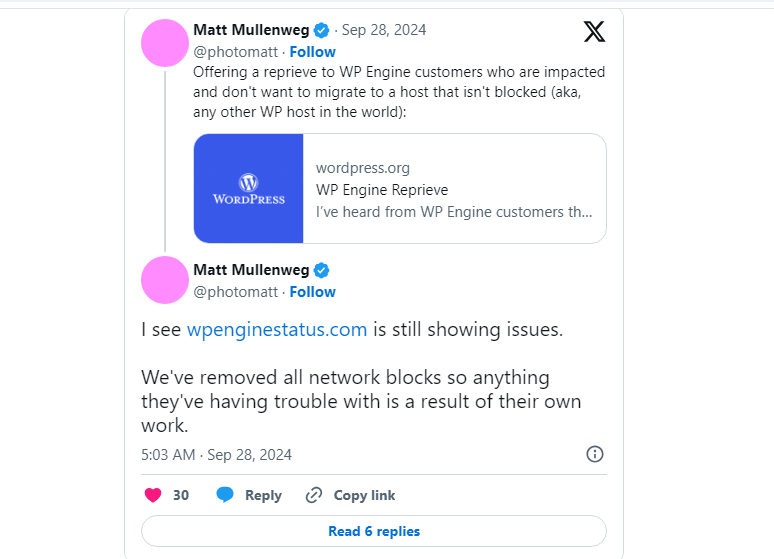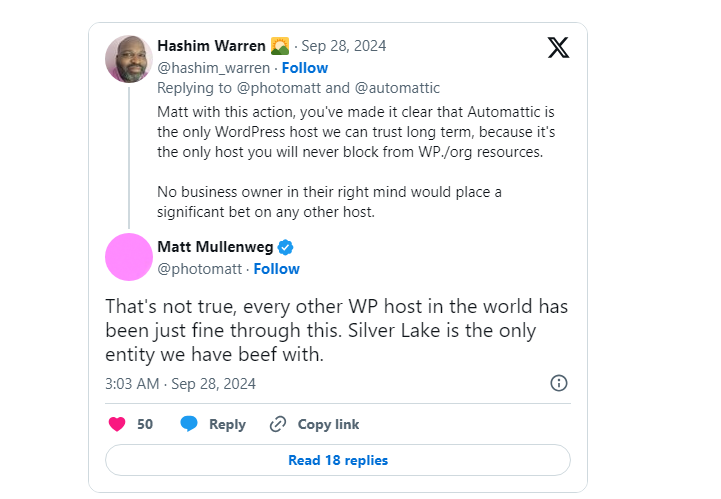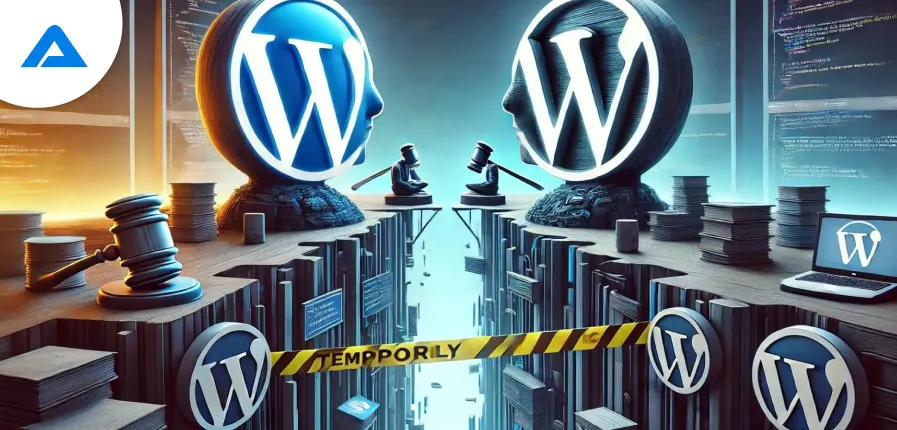As October approaches, the WordPress community’s air is thick with uncertainty. A storm is brewing around WP Engine, a leading managed WordPress hosting provider known for its seamless performance and dedicated support.
With the clock ticking to October 1st, users wonder what this pivotal date will mean for their websites and the future of WordPress hosting.
Unpacking the Controversy
On September 28, WordPress’s co-founder Matt Mullenweg announced a reprieve from the ban imposed on WP Engine, lasting until the specified date.
This move came after WP Engine users faced significant disruptions due to restricted access to WordPress.org resources since September 25.
The conflict stems from WP Engine’s utilization of the “WP” brand without sufficient contributions to the WordPress Foundation and conflicting operational philosophies, particularly concerning data protection and revision tracking features.
“The clash between commercial interests and community values is at the heart of this controversy.”
This situation dives deep into the principles of open-source software and the often-fraught relationship between commercial interests and community-driven development.
The Legal Tug-of-War
What began as a heated debate turned into a full-on legal dispute. In response to Mullenweg’s objections, WP Engine fired a cease-and-desist letter, arguing that its branding constituted a fair use.
The parent company of WordPress attempted to turn the tables by applying rules governing trademark use, thereby opening the floodgates for various claims and highlighting the complexities of trademark rights within open-source software.
This legal entanglement has significant implications. With the WordPress Foundation updating its Trademark Policy, users wonder how these changes might impact their access to vital resources and support.
“Navigating the legal landscape of open-source software requires a delicate balance between innovation and compliance.”

The blurred lines between community and commerce have never been more apparent, creating an atmosphere of uncertainty that permeates the entire ecosystem.
A Temporary Breather

In a surprising twist, Mullenweg temporarily lifted the ban on WP Engine, granting the company access to WordPress resources until October 1st.
This reprieve aimed to give WP Engine time to devise alternative solutions for accessing WordPress.org resources.
However, the motivations behind this decision reveal underlying tensions, as Mullenweg emphasized WP Engine’s previous disregard for attempts to resolve the matter amicably.
The lifting of the ban sparked mixed reactions within the community.
Many saw it as a necessary relief for affected parties, while others raised concerns about the concentration of power within the WordPress ecosystem.
Users and developers alike expressed unease about having a single figure wield such significant control, highlighting the need for a more balanced governance structure.
Community Reactions
The community’s response to lifting the ban was a blend of cautious optimism and skepticism. Many users welcomed the decision, seeing it as a step towards easing the burden on those impacted.
However, critics voiced concerns about the implications of centralized decision-making, fearing that the fate of WordPress resources should not rest on one individual.
WP Engine expressed relief at regaining access to WordPress resources. The company took proactive steps to mitigate future conflicts by clarifying that it is not affiliated with the WordPress Foundation.
This included updating product names to remove “WordPress,” distancing itself legally from perceived trademark infringements.
Yet, lingering concerns remain about how these ongoing disputes could impact the broader WordPress ecosystem, especially for users who rely on commercial open-source products.
What’s Next After October 1st?
As we approach October 1st, WP Engine customers may encounter significant changes in their interactions with WordPress resources.
The temporary lifting of the ban had previously allowed users to access crucial elements like the WordPress plugin and theme directory, which are vital for maintaining and enhancing their websites.
However, as legal discussions continue and trademark disputes linger, WP Engine may need to implement a more permanent solution that could alter user experiences.
Users’ Concerns
Users’ fears about potential service declines and rising costs lie at the heart of this controversy. Many customers speculate on how these developments will affect their overall experience with WP Engine.
There must be a growing apprehension that the company could prioritize profit over customer satisfaction, leading to decreased performance and support.
Existing customers are particularly anxious about being pushed into higher pricing tiers without receiving any additional value in return.
“Small businesses and independent developers are especially vulnerable to sudden cost increases.”

Every dollar counts for small businesses and independent developers, making the possibility of unexpected costs daunting.
Moreover, the thought of diminished customer support only heightens these concerns, as many users have come to rely on WP Engine’s dedicated team for timely assistance.

The Ripple Effect on the Community
The results of this could extend beyond the company WP Engine itself: slower websites, more hours of downtime, and thus a decline in their presence online.
To e-commerce sites, this could mean lost sales and a damaged reputation. More than this, the erosion of trust in WP Engine may force users to review their long-term strategies.
Within the current digital ecosystem, the hosting partner is one of the most critical factors for any online business.
If users start thinking that WP Engine is unreliable, then a gradual movement of users toward alternatives that better fit their needs and expectations may well occur.
This will cascade effect on the WordPress ecosystem, from plugin developers and theme creators to marketing strategies.
Preparing for Future Challenges
As concerns mount, users must brace themselves for the challenges during this transitional period. The first step is to assess their current hosting needs thoroughly.
Are they maximizing the features offered by WP Engine? Is the price they pay justified by the quality of service received?
Reflecting on these aspects empowers users to make informed decisions moving forward.
Other noted choices, such as SiteGround and Kinsta, have earned good reputations for stability and customer service. It is worth studying these options to see what users of the service can be sure to expect from various providers.
Exploring Viable Solutions
While this is a grim situation for WP Engine and WordPress users, a few things can be done to take the sting out of this news.
First, options for hosting services should be researched. One example is WeWP, which is both easy to use and very powerful. These attributes make it a perfect choice for anyone needing a reliable, managed WordPress hosting company.
Also, it would help if you planned diversification for your web applications. Platforms like Vercel or Netlify have further flexibility, especially for developers interested in static sites or modern web apps.
These usually offer a pay-per-use approach where users can scale resources according to demand.
The Future of WP Engine and WordPress
Into October and beyond, the future of WP Engine and the entire WordPress community is vague but full of possibilities.
It is possible that WP Engine may reconsider modifying its pricing structure to accommodate users’ concerns or expand its service offerings. Still, it depends on whether it wishes to listen to its users.
On the other hand, this turmoil could give way to new players in WordPress hosting.
With users looking for reliable alternatives, coming players would strive to offer innovative solutions with excellent customer service and a new competitive landscape might be shaped.
Conclusion
In a world where the digital landscape is constantly evolving, the situation surrounding WP Engine and WordPress serves as a reminder of the need for vigilance and adaptability.
While it’s unfortunate that we find ourselves in this predicament, it also presents an opportunity for growth and resilience.
Users can proactively safeguard their online presence by evaluating their hosting needs, exploring alternative providers, and preparing for potential challenges.
By staying informed and adaptable, the WordPress community can continue to thrive, no matter what changes lie ahead.
As we approach October 1st, let’s embrace this moment as a challenge and an opportunity for a stronger, more resilient digital future.

Find out why custom WordPress web development is the ultimate preference for your business needs!

Pooja Upadhyay
Director Of People Operations & Client Relations

